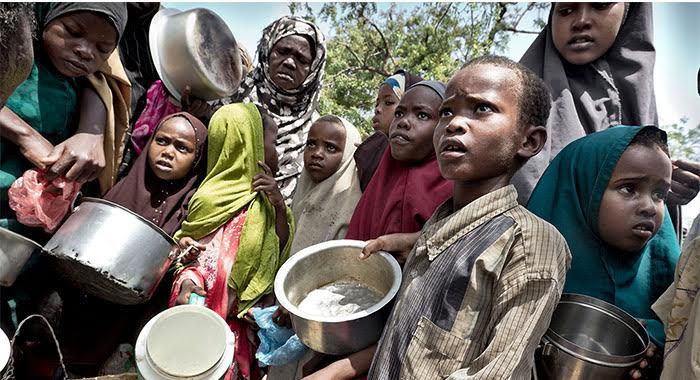Hunger Crisis in Northwest Nigeria: Thousands at Risk as Food Insecurity Worsens
- Glory Eze
- Jan 17
- 3 min read

In northwest Nigeria’s Zamfara State, two-month-old Rahila Murtala lies motionless, her frail body showing the unmistakable signs of severe malnutrition. Too weak to cry, her eyes remain shut as hunger leaves deep marks on her face. Her mother, Bashirya, 20, looks on helplessly.
“She has been weak since I gave birth,” Bashirya says, her voice flat with exhaustion.
Rahila and her family are among 5,000 displaced people taking refuge in an abandoned palace in Anka, a town increasingly gripped by insecurity and hunger. The once-majestic structure, once home to the Emir, is now filled with makeshift tents sheltering those fleeing violence and hardship.
“We moved here because our home was no longer safe,” Bashirya says. Her husband earns just 500 naira (25p) a day as a bricklayer, barely enough to buy a small portion of dry spaghetti. “On days he can’t find work, we don’t eat,” she adds.
A National Crisis
Despite being Africa’s most populous nation and largest economy, Nigeria is grappling with one of the worst food insecurity crises in its history. According to United Nations data, approximately 32 million Nigerians—14% of the population—are facing crisis-level hunger, with the northwest emerging as a particularly hard-hit region.
The crisis raises questions about the country’s governance and the unequal distribution of its resources. Nigeria’s economy has grown significantly over the past 65 years, but widespread corruption, economic mismanagement, and global disruptions have eroded the benefits for ordinary citizens.
President Bola Tinubu’s recent economic reforms, aimed at stabilizing the economy, have further strained household budgets. The removal of a decades-old fuel subsidy quadrupled transportation costs, while the devaluation of the naira has caused inflation to soar. These measures, though supported by the World Bank as necessary for long-term growth, have plunged millions deeper into poverty.
The Northwest Under Siege
In the northwest, insecurity compounds the food crisis. Armed groups, known locally as bandits, routinely attack rural communities, displacing thousands and destroying farmland.
In Katsina State, villagers have formed vigilante groups to protect themselves, filling the gap left by overwhelmed security forces. “We faced a lot of challenges,” says Sani Alyu, 29, a farmer who joined a vigilante group after bandits repeatedly attacked his village. “They have sophisticated weapons, and we couldn’t defend ourselves without organizing.”
Last year, Sani’s community was forced to pay 3 million naira (£1,400) in “taxes” to access their own crops. When they refused to comply, the bandits set their fields on fire, leaving them with nothing.
Kidnapping has also become rampant. In one case, 33 villagers were abducted, with a ransom demand of 6 million naira. Although the community managed to secure their release, 16 people remain missing.
The Impact on Women and Children
Women and children bear the brunt of the crisis. The World Food Programme (WFP) reports that 5.4 million children and 800,000 pregnant or breastfeeding women are at risk of acute malnutrition in Nigeria.
In Sokoto State, a WFP-supported neonatal nutrition clinic admitted 10-month-old Saadatu Abubakar in critical condition. Diagnosed with severe malnutrition, sepsis, and anemia, she required a blood transfusion upon arrival. Her mother, Aisha, had traveled 30 kilometers at great expense to seek help.
“I feel helpless,” Aisha says. “Even if she gets better, we might end up back here because I can’t afford enough food.”
Doctors Without Borders (MSF) has treated more than 100,000 children for malnutrition in northwest Nigeria this year alone, a 20% increase from 2023. In Katsina State, surveys show over 30% of children suffer from acute malnutrition, with more than 14% experiencing severe wasting.
Structural Challenges and Future Outlook
The crisis has highlighted the lack of infrastructure and humanitarian access in Nigeria’s northwest. Insecurity prevents aid workers from reaching many affected areas, leaving families without support.
Dr. Raphael Kananga, MSF medical coordinator, described the malnutrition rates as “terrifying,” warning that without urgent action, “children will continue to die in record numbers.”
The ripple effects of food insecurity also extend beyond immediate hunger. Malnourished mothers give birth to underweight and stunted children, perpetuating a cycle of poor health and limited opportunities.
Meanwhile, protests over rising costs and unemployment have intensified in urban centers, with a doubling of the minimum wage in July failing to stem the anger.
For displaced families like Bashirya’s, the outlook remains bleak. “We need help,” she says, holding her silent, emaciated child. “Without it, we can’t survive.”
Comentarios